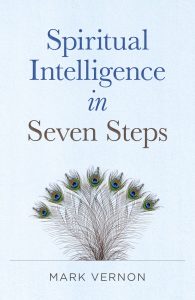
A review of Spiritual Intelligence in Seven Steps, published in the Church Times.
WE ARE not human beings who have spiritual experiences, but spiritual beings who have human experiences. So wrote Pierre Teilhard de Chardin. In this important and challenging cri de coeur, the psychotherapist and erstwhile Anglican priest Mark Vernon confirms that “spiritual intelligence is basic to being human.”
But he is fearful that “it has become so overlooked and sidelined in the modern world that people are inclined to . . . deny that it exists altogether.” So, we must wake up to it before it is too late: our future as a species may depend on it. Homo spiritualis is at risk of suppression in an age when it is reductionist scientism and materialism that are dictating how our humanity, and the environment that we inhabit physically, emotionally, and intellectually, are being understood, articulated, and threatened.
But what is spiritual intelligence? Well, anyone who has thoughts, feelings, and experiences can do so only because of the side of life which spiritual intelligence sees is operative and active. It is a type of perception “which delivers a felt sense that our experience of things is connected to a wider vitality . . . that there is more underpinning existence, and this appears upon closer inspection to be unvaryingly, universally, energetically present”.
Crucially, it is not the opposite of the material, but, rather, is the reason that the material world can be so radiant. It is fundamental to grasping the nature of being, and “can be said to be prior to religion”.
In an approach reminiscent of the most influential wisdom traditions, Vernon takes us through a series of seven steps designed to deepen understanding of spiritual intelligence and its place in our lives. It is an invitation “to step into another relationship with the world that is richer and an enlargement”.
From the beginning, Homo sapiens has always been Homo spiritualis, and from this initial state individuality emerged. But subjectivity has been subordinated to so-called “objective truth” in modern times — a step that spiritual intelligence radically challenges. Step four relates spiritual intelligence to the concept of soul, and step five offers a profoundly moving reflection on how spiritual intelligence affects our approach to death and dying.
The final two steps argue for virtue as the most appropriate moral articulation of spiritual intelligence, and how it can creatively inform our relationship to time and “the capacity to embrace crises and irruptions”.
While he believes that “ours is a moment for a conversion of sorts,” as an agnostic, he asserts that this should not be “to any one theological system or particular revelation”. That said, religious figures such as Jesus, the Buddha, and Confucius feature regularly, even if he remains sceptical about the effectiveness of today’s Church when it comes to fostering spiritual intelligence.This remarkable journey engages easily with Eastern mysticism, Western film and fiction, personal biography, and professional psychotherapy, citing luminaries from Socrates to William Blake — and even an illuminating shopping expedition for tomato soup.
If our times are spiritually impoverished, then Vernon offers a pathway towards the rediscovery, appreciation, and activation of spiritual intelligence as essential to our basic humanity, and crucial to our future flourishing.
John Saxbee